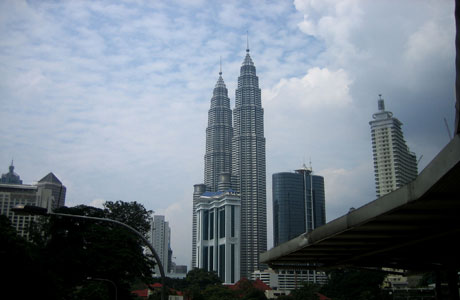From a largely rural country recovering slowly from conflict a generation ago, Malaysia has fast become one of the region’s economic powerhouses. It’s now the third-largest economy in the region, and in the top 30 in the world. Moving from mining and farming as the country’s core industries, it has become a high tech centre with a range of industries that bring in overseas cash - including natural resources, tourism and manufacturing. It is also a major centre for Islamic banking.
From a largely rural country recovering slowly from conflict a generation ago, Malaysia has fast become one of the region’s economic powerhouses. It’s now the third-largest economy in the region, and in the top 30 in the world. Moving from mining and farming as the country’s core industries, it has become a high tech centre with a range of industries that bring in overseas cash - including natural resources, tourism and manufacturing. It is also a major centre for Islamic banking.
It’s also highly regarded as an environment for international investors. The big international banks all have bases here, and Malaysia has provided significant returns for overseas funds. As with other countries in the region, it suffered during the Asian crisis, but its recovery has been swift.
In general, foreign ownership of Malaysian companies is restricted to 30 per cent as listed in their M & A or governed by Ministry guidelines. There are exceptions where the 30 per cent limit can be exceeded, in particular for companies, which mainly produce goods for export.
The aggregate foreign ownership limit in telecommunications companies is 61 per cent. However, a government restriction requires foreign companies to reduce their stake back to 49 per cent after five years.
The foreign shareholding limit for new entries in direct insurers was increased from 30 per cent to 49 per cent with effect from August 24, 2006, to harness the potential for financially strong and internationally known foreign players.
When it comes to shareholdings in the country’s banks, the prior written approval from the Minister of Finance is required where a person or persons acting in concert with a person, who acquires or disposes of any shares of a licensed institution, equal to five per cent or more of the shares of that institution to any single person or persons acting in concert.
Except where the Minister of Finance otherwise approves, no person shall hold more than the following percentages of interest in shares of a licensed institution: In the case of an individual, 10 per cent; and in the case of a person other than an individual, 20 per cent
As of March 2005, the banking sector has been liberalised to allow foreigners to acquire up to 49 per cent stake in Islamic bank subsidiaries of local banking groups. Commercial banks can now sell up to 49 per cent of their Islamic banking units, subject to the condition that the Islamic bank remains a subsidiary of the commercial banking institutions.
Voting rights are generally available to foreign investors who hold shares at least three business days prior to voting or the specific record date set by the issuer, except where it has exceeded the company’s Foreign Ownership Limit.
Once the limit on foreign-owned shares is reached, the companies concerned can ask for a separate listing of their foreign and local contents. However, this is not mandatory. Note that there is no restriction on foreigners who wish to buy, hold or trade in shares which have reached their foreign holding limit or local shares where such shares are quoted separately. Such shares would be classified as “restricted shares” and the general practice with regard to the treatment on corporate action entitlements is that holders of these ‘restricted’ shares which have exceeded the prescribed foreign ownership limits will not have voting rights, but will rank pari passu with other ordinary shares in all aspects of entitlements declared by the issuer.
Short selling regulations were introduced in 1996, relatively early for what was then a very emerging market. The business didn’t last long; at the heart of the Asian crisis less than a year later, securities borrowing and lending was suspended on all shares listed on Bursa Malaysia.
In 2007, a new system was introduced. The Bursa SBL system, offered by Bursa Malaysia Securities Clearing, specifies which shares are currently eligible for borrowing and lending - the numbers vary, but most publicly traded shares are permitted.
Securities borrowing and lending (SBL) activities in Malaysia must either be made through an approved clearing house acting as a central lending agency (CLA) under the SBL-CLA model; or entered directly over-the-counter between the eligible participants and facilitated by the approved clearing house under the SBL - negotiated transactions (SBL-NT) model.
The approved clearing house acting as a CLA and the eligible participants are deemed to be the authorised lender and/or authorised borrower, and the agreement between the approved clearing house and the eligible participants constituted by the documents (including the terms and conditions for lending participant or lender, terms and conditions for borrower, circulars and rules of the approved clearing house) specified in the rules of the approved clearing house for the borrowing or lending of eligible securities in accordance with the requirements of the rules of the approved clearing house are deemed to be securities borrowing and lending agreements approved by the SC (approved SBL agreement).
Only approved local licensed dealers may borrow securities from Bursa Clearing on standard terms, and the collateral provided has haircuts determined by Bursa Clearing. Each offer to lend to Bursa Clearing must be a minimum of 50,000 units.
The SBL will be introduced in stages. In the subsequent stages, Bursa will enhance the SBL framework further for all participants. This may include securities borrowing and lending on an over-the-counter basis (OTC) in which the terms of borrowing and lending are negotiated between the parties.
The other option is RSS, or regulated short selling. RSS is defined as the selling of stocks which the person does not presently own but for which such person has made arrangements to borrow. Any individual can engage in RSS. The settlement of the short sales will be with the borrowed stocks. The borrowing must be made within the approved SBL framework established by Bursa.
Under the SBL CLA framework, the securities clearing house, Bursa Clearing will act as a Central Lending Agency (CLA). As the CLA, Bursa Clearing will borrow from lenders and onward lend to borrowers. Any person who has the requisite number of stocks may lend stocks to the CLA. On the other hand, only approved local stockbrokers may borrow stocks from the CLA. Any other investors who wish to borrow stocks must go through the approved local stockbrokers.
Bursa had in August 2009 introduced the SBL NT (Negotiated Transaction) model where it provides both Approved Lenders and Approved Borrowers the avenue to agree SBL transactions an over-the-counter basis (OTC) and report such transactions to Bursa Malaysia via on-shore lending representatives or borrowing representatives.


